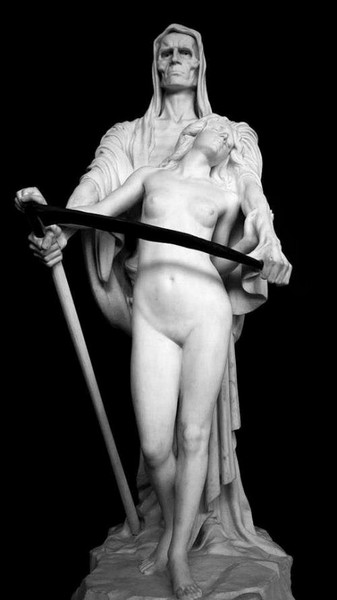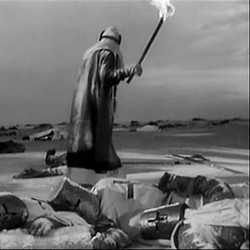
Children think covering their eyes make them invisible, and adults avoid mentioning unpleasant, unavoidable things, as this could make them disappear. That explains the name Modest Mussorgsky thought for the cycle he was writing, Ona; that's to say, Her, a way often used in Russia to refer to death (smert has feminine genre) at a time when mortality was extremely high. The songs were defined by the composer as a Danse Macabre, referring to the medieval allegory on the universality of death, which equals young and old, rich and poor people (by the way, you can still watch a Danse Macabre, or Dansa de la mort every Good Friday in Verges, a small village in Catalonia).
The Danse also had a graphical representation, and several books are preserved in which each engravery represents a personification of death, taking with her some character (a child, a woman, a noble...). This was Mussorgsky's idea, making a series of songs (it's thought he planned about twelve) that told the encounter between death and different characters. He counted on the collaboration of his friend Arseny Golenishchev Kutuzov, whose poems inspired twenty of his about sixty songs. In this case, however, Mussorgsky didn't set into music poems he had read previously; it's thought that he commissioned a collection of poems (we spoke a while ago about a similar case, the cycle Krämerspiegel by Richard Strauss).
In 1875, shortly after the premiere of Boris Godunov, Mussorgsky composed three songs in which death visited a child, a sick young woman and a drunken peasant. A couple of years later, he wrote a fourth song, in which the unlucky person visited by death was an old soldier during a battle. And he didn't write any other songs, we don't know exactly why. His friendship with Golenishchev-Kutuzov is said to have cooled off, or maybe he lost interest in the project, or perhaps his already very damaged health didn't allow him to work as much as he would like. The only four songs of the cycle he composed were published posthumously with the title Песни и пляски смерти (Pesni i pljaski smerti, Songs and Dances of Death).
This week we will listen to the second song, Серенада (Serenada, Serenade) which shares with the rest a similar structure. A narrator describes the situation in the first part; in this case, a nice, mild Spring night invites going out, but the sick young woman can only stay by the window. In the second part, death, who has taken the appearance of a man singing a serenade, speaks. He tells her how beautiful she is, and how much he wishes to embrace her and free her from suffering. And since no one can resist death, he seduces her.
Many of you might have found the similarity with a much better-known Lied, Der Tod und das Mädchen (Death and the Maiden) which we already heard. In Schubert's work, the terrified maiden rejects death, and he offers her rest. In Mussorgsky's song, the young woman doesn't say a word, so we don't know her reaction. In both songs, we can ask ourselves whether the knight sings the serenade in good faith, or whether he only wants to deceive the girl. In Schubert's case, as I told you back then, I think he means well, but in the case of Mussorgsky, I'm not that sure. Beyond the deliberate sex change of Russian death (the German word Tod is masculine and death is usually represented as a man), it's the music, which is ultimately the most important, what worries me: don't you hear a note of triumph in the last words of death? The same triumph we hear, for example, at the end of "Là ci darem la mano" in Don Giovanni?
Listen to this Serenade; listen to Schubert's Lied too and, if you want, share your opinion. In any case, I think we will all agree that Gerald Finley's voice (joined by pianist Julius Drake as usual) is always seductive.
Trepetnyj sumrak vesny.
Vnemlet, poniknuv golovkoj, bol'naja
Shopot nochnoj tishiny.
Son ne smykajet blestjashchije ochi,
Zhizn' k naslazhden'ju zovjot,
A pod okoshkom v molchan'i polnochi
Smert' serenadu pojot:
,,V mrake nevoli surovoj i tesnoj
Molodost' vjanet tvoja;
Rycar' nevedomyj, siloj chudesnoj
Osvobozhu ja tebja.
Vstan', posmotri na sebja: krasotoju
Lik tvoj prozrachnyj blestit,
Shchjoki rumjany, volnistoj kosoju
Stan tvoj, kak tuchej obvit.
Pristal'nykh glaz goluboje sijan'e,
Jarche nebes i ognja;
Znojem poludennym vejet dykhan'e...
Ty obol'stila menja.
Slukh tvoj plenilsja mojej serenadoj,
Rycarja shopot tvoj zval,
Rycar' prishjol za poslednej nagradoj:
Chas upojen'ja nastal.
Nezhen tvoj stan, upoitelen trepet...
O, zadushu ja tebja
V krepkikh ob"jat'jakh: ljubovnyj moj lepet
Slushaj!... molchi!... Ty moja!``
Трепетный сумрак весны.
Внемлет, поникнув головкой, больная
Шопот ночной тишины.
Сон не смыкает блестящие очи,
Жизнь к наслажденью зовёт,
А под окошком в молчаньи полночи
Смерть серенаду поёт:
,,В мраке неволи суровой и тесной
Молодость вянет твоя;
Рыцарь неведомый, силой чудесной
Освобожу я тебя.
Встань, посмотри на себя: красотою
Лик твой прозрачный блестит,
Щёки румяны, волнистой косою
Стан твой, как тучей обвит.
Пристальных глаз голубое сиянье,
Ярче небес и огня;
Зноем полуденным веет дыханье...
Ты обольстила меня.
Слух твой пленился моей серенадой,
Рыцаря шопот твой звал,
Рыцарь пришёл за последней наградой:
Час упоенья настал.
Нежен твой стан, упоителен трепет...
О, задушу я тебя
В крепких объятьях: любовный мой лепет
Слушай!... молчи!... Ты моя!``

















Comments powered by CComment